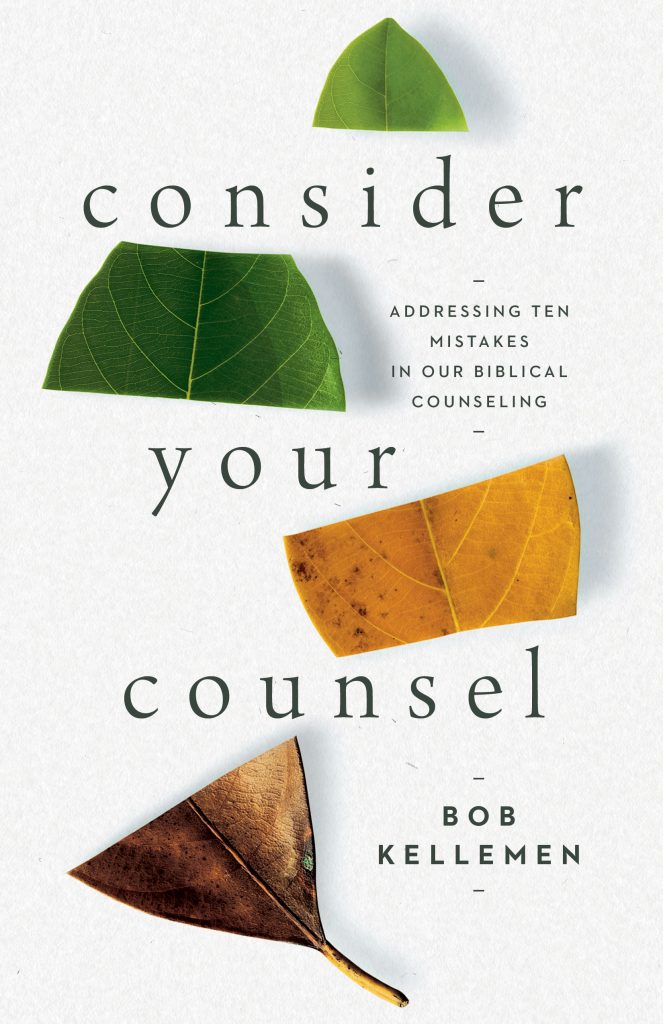When it comes to emotions, we seem disposed to extremes, even in the Christian world. Some of us act as if emotions are a result of the fall, so we stuff them or ignore them. Others of us act as if emotions are king, and we allow them to rule us.
Some of us as biblical counselors seem to view emotions as not worthy of being considered part of the image of God. We accept that God created us with a soul to relate, a mind to think, and a will to choose. But we act as if emotions were not God’s idea. We see emotions more as a cursing than a blessing: more harm than good; suppress them; ignore them; don’t have them.
Some not only devalue emotions; they demean them. We’ll often hear, “Don’t trust your emotions.” This is shared as a blanket statement implying that somehow emotions are “more fallen” than our desires, beliefs, and motivations. It would be more biblically accurate to say, “Don’t trust any desires, beliefs, motivations, or emotions that are not being surrendered to the Spirit’s control and evaluated through the grid of God’s Word.”
GOD’S ORIGINAL DESIGN FOR OUR EMOTIONS
What does the Bible teach about our emotions? What model of Christlike emotionality do we find in God’s Word? If we are to live godly lives—Christlike lives—then we need God’s perspective on emotions. And if we are to counsel biblically, then we need a biblical, practical theology of emotions. (For a fuller examination of the Bible’s teaching on emotions, see What Does the Bible Teach About Our Emotions? Learning the ABCs of Emotional Intelligence.)
We’ve forgotten that when God paused to ponder his image bearers, he declared that they—emotions included—were “very good” (Genesis 1:31). Feelings were God’s idea.
God created us in his image, including his emotional image. As John Piper notes in The Pleasures of God, “God’s emotional life is infinitely complex beyond our ability to fully comprehend.” Our emotionality is designed by God and like God. Our emotions were created very good.
EMOTIONS: FEARFULLY AND WONDERFULLY MADE
Emotions are God-given. Adam had them before the fall. Christ has them. Emotions are not sinful; they are beneficial and, yes, even beautiful.
The psalmist understood this. In Psalm 139—the classic passage describing God’s utmost care in creating us—emotionality is the one aspect of our inner personality specifically referenced: “For you created my inmost being; you knit me together in my mother’s womb” (Psalm 139:13 NIV, emphasis added). “Inmost being” is kidneys or reins in the KJV. Psalm 73:21 uses the same word to mean grieved and embittered. And in Proverbs 23:16, the kidneys are the place of rejoicing and gladness.
In Anthropology of the Old Testament, Hebrew language expert Hans Wolff explains that the Semitic language uses terms for kidneys, reins, stomach, bowels, and womb to describe the feeling states. As we literally experience and feel an emotion in our physical being, we feel an emotion in our inner being. That’s why we say things like, I have butterflies in my stomach.
God created your inmost being, your kidneys, your emotions. Your emotions are fearfully and wonderfully made—by God. In fact, your emotions are the one element that God highlights as having been fearfully and wonderfully made.
WHY DO WE FEEL WHAT WE FEEL?
Why did our heavenly Father create us with emotions? What is their purpose and function? The root of the word emotion is motere, from the Latin verb “to move,” plus the prefix “e” meaning “to move away.” This suggests that a tendency to act is implicit in every emotion. All emotions are, in essence, inclinations to act and react. This means that God designed our emotions to put us in motion.
Emotions represent an inner response that motivates outward action—emotions signal the mind to go into high gear. To understand this biblically, consider 1 Peter 5:7–8 (NIV): “Cast all your anxiety on him because he cares for you. Be alert and of sober mind. Your enemy the devil prowls around like a roaring lion looking for someone to devour.”
We often fail to relate these two verses even though they appear together in Scripture. Anxiety, like all emotions, is an emotion that motivates us to act. Our emotions and our mind sense something that we perceive to be dangerous—a threat.
We can respond to that anxiety-provoking situation with fear of people and unnecessary self-protection—with fallen emotional responses. Or we can respond to that anxiety-provoking situation by casting our anxiety on him and by being alert and vigilant. We could describe the creation (pre-fall) side of anxiety as vigilance— the ability to pick up on cues in our world and to respond in a God-dependent, other-protecting way.
We don’t need to think of emotions, including anxiety, as always sinful. We could take what Paul said in Ephesians 4 about anger and paraphrase it to include 1 Peter 5:7–8 with anxiety.
Be anxious, but do not sin. Instead, when your emotional sensors detect a threat, then cast your anxiety upon the Lord. Use your anxiety to warn yourself to keep alert and vigilant. Don’t be like Adam in the garden who went off sentry duty when the serpent tempted him and Eve. Instead, be like Christ who was always on sentry duty to protect his disciples against the attacks of the Evil One.
Instead of seeing emotions as only evil or fallen, we need to understand that God designed emotions to play a crucial role that moves us to do a double-check, to look outward and inward. Emotions are our “inner sentinel” that connect us to our inner and outer world.
Now we can suggest working definitions of emotions:
- Emotions are our God-given capacity to connect our inner and outer world by experiencing our world and responding to those experiences.
- Our emotional capacity includes the ability to internally experience and respond to a full-range of both positive (pleasant) and negative (painful) inner feelings.
A BIBLICAL MODEL FOR UNDERSTANDING OUR COMPLEX EMOTIONAL RESPONSES
We’ve said that God designed us as emotional beings. However, that does not mean that we are only or primarily emotional beings. Nor does it mean that our emotions are meant to control us. Instead, God designed us so that our emotions submit to and respond to our beliefs and convictions. Though no linear outline can encompass the rich inner workings of our inner life, we can begin to picture the interaction of emotions, beliefs, desires, and motivation like this:
- What we believe (Rational Direction; Romans 12:1–2)
- about God and life (Relational Affection; Psalm 42:1–2)
- informs the direction we choose to pursue (Volitional Motivation; Joshua 24:15), and
- impacts our experiential/emotional response (Emotional Reaction; Ephesians 4:17–19) to our world.
What we believe –> about God and life –> informs the direction we choose to pursue –> and impacts our experiential/emotional response to our world.
Let’s consider again how this plays out in 1 Peter 5:7–8. The context of this passage is a Christian response to suffering and persecution. Notice the key to how we respond to suffering—it’s in the phrase “because he cares for you.” We cast our anxiety on him as a response to our conviction that he cares for us.
- Our belief about God (that he cares for us) is what motivates our godly response (casting our cares on God and vigilantly resisting the devil) to feelings of anxiety.
- Godly beliefs (rational direction) encourage and incite godly affections (spiritual affections), which in turn prompt godly motivation and actions (volitional motivation) and ultimately encourage Christlike handling of our emotions (emotional reactions).
GOD DESIGNED OUR EMOTIONS TO INTERACT WITH OUR INNER AND OUTER WORLD
Now let’s take this introductory theology of our inner life and consider a practical biblical model for understanding emotions. As we do this, realize that we are taking the intensity and complexity of emotions and placing them in “outline form.” We all know that we can’t bullet point our feelings. We all understand that our feelings are complicated, messy, real, and raw. Yet it is helpful to counselors and counselees to bring some logical understanding to what can feel like the “illogic” of emotions.
- Our External Situation + Our Internal Perceptions Provide the Inner and Outer Context for Our Emotional Response.
We might summarize our complex emotional responses to negative situations like this:
- Negative Situation + Biblical Belief = Legitimate Painful Emotion (Sorrow, Sadness, etc.)
- Negative Situation + Unbiblical Belief = Illegitimate Painful Emotion (Hatred, Despair, etc.)
Your boss says to you, “You blew it.” Your emotions react to this negative external situation and to your internal beliefs. What if you had a biblical belief: “I enjoy my boss’s approval, but I don’t need it, and I know that in Christ I am accepted by God”? Then you could likely respond with legitimate painful emotions such as sorrow, disappointment, or remorse (if you were in the wrong).
On the other hand, what if “fear of people” is a besetting sin in your heart? What if you believe you must have your boss’s approval? Then you might respond with illegitimate negative emotions such as uncontrolled anger, depression to the point of despair, hopelessness, or hatred.
We might summarize our complex emotional responses to positive situations like this:
- Positive Situation + Biblical Belief = Legitimate Positive Emotion (Joy, Peace)
- Positive Situation + Unbiblical Belief = Illegitimate Positive Emotion (Pride, Self-Sufficiency, etc.)
Now let’s say your boss says to you, “You always do A+ work!” You could respond to that positive external situation with a biblical belief like the following: I live for an audience of One—Christ, and I am glad that my Christlike work ethic glorifies my heavenly Father. You might then experience positive legitimate emotions like peace, joy, and contentment.
On the other hand, if your boss says, “You always do A+ work,” and you are living for the praise of people, then you might experience illegitimate positive emotions like pride and arrogance.
In summary, the key to our emotional reaction is our belief or perception about the meaning behind the event. Events impact whether our emotions are pleasant or painful. Our longings, beliefs, and goals impact whether our emotional reaction is holy or sinful.
BIBLICAL COUNSELING AND OUR EMOTIONS
Of course, our emotional lives are never so nice and neat. The reality is that few of our external situations are only positive or negative, and few of our internal beliefs are only wise or foolish. Additionally, not only are emotions impacted by our beliefs; our beliefs are impacted by our emotions. Let’s be honest—life is messy; emotions are messy!
This is the beautiful value of a biblical counseling relationship. With all the confusion of emotions, we need another person to help us sort out what is happening to us and what is happening in us.
However, biblical counselors can’t be helpful unless we have a practical biblical theology of emotions. So the first need is for biblical counselors to realize that emotions are not to be devalued but are of great value. Emotions are not to be demeaned but are instead God-designed core aspects of the image of God in us. Biblical counselors value the God-designed role that emotions play in our Christian lives and relationships.
Excerpted from Consider Your Counsel: Addressing Ten Mistakes in Our Biblical Counseling © 2021 by Bob Kellemen. Used with permission of New Growth Press. May not be reproduced without prior written permission.
Consider Your Counsel: Addressing Ten Mistakes in Our Biblical Counseling
Bob Kellemen comes alongside counselors and shares where he and others have missed the mark. Drawing on more than three decades of counseling supervision experience, he unpacks ten of the most common missteps that he has noticed in his own counseling, as well as those he has mentored.






